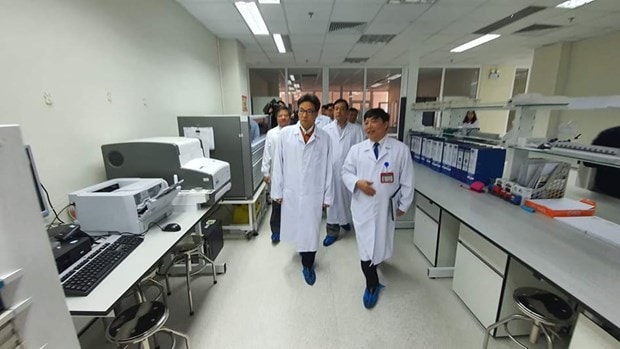Deputy Prime Minister Vu Duc Dam: Do not let people panic about the new coronavirus pneumonia epidemic
Inspecting the work of preventing and combating acute respiratory infections caused by the new coronavirus, Deputy Prime Minister Vu Duc Dam requested the health sector to provide full information about the epidemic to the people.

In the face of the complicated developments of the acute respiratory disease caused by the new coronavirus strain in China and other countries and territories, on the morning of January 23, Deputy Prime Minister Vu Duc Dam personally inspected the epidemic prevention and control work at the National Hospital for Tropical Diseases - Branch 2, Dong Anh District, Hanoi.
After inspecting the laboratory system, testing rooms and disease prevention rooms, Deputy Prime Minister Vu Duc Dam requested the health sector to clarify to the people about the current epidemic situation as well as make recommendations on disease prevention, to avoid making people panic and worry too much, in the context of the whole country celebrating the Lunar New Year.
"People are most concerned about whether this disease is contagious or not? Currently, experts have divided the spread of the disease into many levels: not contagious from person to person; contagious from person to person but difficult to spread and limited; or very contagious. So what is the current level of contagiousness from person to person, what is the transmission mechanism, and what are the symptoms and incubation period so that people can be advised not to panic or worry too much?" - the Deputy Prime Minister asked.
Answering the Deputy Prime Minister's questions, Professor-Doctor Nguyen Van Kinh, former Director of the Central Hospital for Tropical Diseases, said that the nature of this virus is still the same coronavirus strain that caused the SARS (2003) and MERS (2017) pandemics.
The disease is transmitted through the respiratory tract. Within 2 meters, if people around inhale droplets of saliva or sneeze of the sick person, they will be at risk of getting the disease. Therefore, the disease can spread.
After investigating more than 400 cases, the World Health Organization (WHO) initially determined that this was a virus of animal origin, but the strain is currently unknown and there is clear evidence of human-to-human transmission.

Like SARS, this virus can be transmitted from patients to medical staff, so not only the public but also medical staff are at risk of infection.
"This is a warning so that medical staff - those who directly care for patients - cannot be negligent, lose vigilance and must take precautions from the beginning" - Professor - Doctor Nguyen Van Kinh emphasized.
In terms of clinical presentation, acute pneumonia caused by the new coronavirus (nCoV) is similar to SARS, in that patients will have acute respiratory infections leading to pneumonia and respiratory failure.
When both lungs are completely damaged, the patient will not be able to exchange oxygen, leading to brain damage, multiple organ failure, and the patient will die. If not controlled, the mortality rate will be high.
Up to this point, there is no specific medicine for corona virus, so prevention and treatment are still based on disease prevention and detection and treatment of symptoms and complications.
This virus is currently spread through the respiratory tract, at first we thought that this virus spread was limited but according to reports from China, this virus is spreading very quickly but the rate depends on our response to the spread of the virus.
Professor-Doctor Nguyen Van Kinh emphasized: "If we can prevent it, the virus will spread slowly, but if we cannot prevent it, the epidemic will spread very quickly, with a high risk of death. This is something we must prevent in advance."
Deputy Prime Minister Vu Duc Dam requested strict control of border gates, especially those from China, and readiness to monitor and quarantine at the border gates when suspected cases are detected. All treatment facilities must strictly follow the Ministry of Health's instructions, and patients must be quarantined and treated immediately. The Ministry of Health must proactively inform about the epidemic situation in Vietnam and the world.
The Deputy Prime Minister directed that although this is the Tet holiday, if a family member has a fever, close contact should be limited and taken to a medical facility promptly, because this is a mutated virus strain from the SARS era and there is no specific treatment.
"Vietnam has experience in preventing and fighting many epidemics, but at this time, everyone must be ready to respond to the worst-case scenario and always have measures higher than normal, especially during the Lunar New Year holiday," Deputy Prime Minister Vu Duc Dam requested.
Also on January 23, Prime Minister Nguyen Xuan Phuc signed and issued an official dispatch on the prevention and control of acute respiratory infections caused by nCoV, requesting the Ministry of Health, ministries, branches and local authorities to resolutely carry out disease control work.
To date, China has recorded over 541 cases of the disease, including 15 medical staff, and 17 deaths; cases have been recorded in several other countries.

